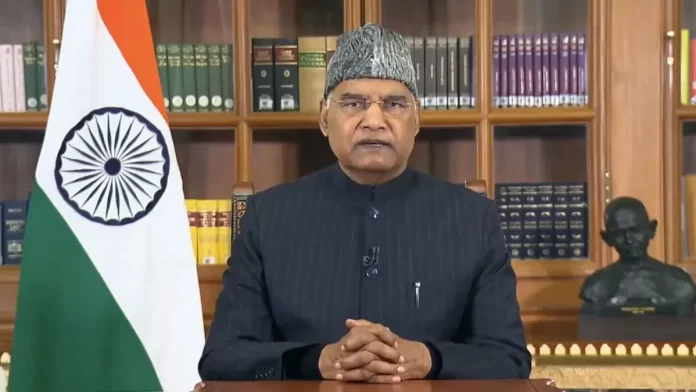Indian President Ram Nath Kovind on Sunday graced and addressed the 95th All India Marathi Literary Conference through a video message. In his address, the President recalled the glorious Marathi traditions centered on equality and egalitarianism.
At the outset, the President appreciated the organizers for naming the venue of the Conference after Bharat Ratna Lata Mangeshkar, the President said that such a meaningful use of the name of Lata Ji has given a timeless legacy to the culture of India and Maharashtra is appropriate.
Pointing to the fact that Maharashtra Udayagiri Mahavidyalaya of the Maharashtra Education Society is marking its Diamond Jubilee this year, the President congratulated the entire team of the college for making a continuous contribution in the field of education for the past sixty years.
Noting that the college was established by the farmers and traders of the Udgir region with their hard-earned money, he said that society and nation progress only with such extraordinary contribution of ordinary citizens. He said that we should gratefully remember the contribution of the founders on this occasion.
Jyotiba Phule and Babasaheb Ambedkar
Remembering the literary contributions of Mahatma Jyotiba Phule and Babasaheb Dr. BR Ambedkar, the President said that Mahatma Jyotiba Phule wrote revolutionary books like ‘Gulamgiri’ and ‘Tritiya Ratna’.
The play ‘Tritiya Ratna‘ is considered an important work of social theatre. It drama depicts how Brahmins exploit ignorant shudras. It also extols a Christian preacher who showed the exploited shudras, the way of truth.
In other words, the Tritiya Ratna effectively depicts the importance of education by illustrating how the ignorant Bahujan masses are cheated by Brahmanical forces.
Babasaheb Ambedkar enriched the thinking of Maharashtra as well as the whole country with the ideals of modernity and equality through his publications like ‘Bahishkrit Bharat’ and ‘Mooknayak’.
On that egalitarian ideology and spirit, talented writers of the deprived classes, in the modern era, have composed literature in Marathi which is called Dalit literature.
The President said that equality and valor are the identities of Maharashtra.
In the 17th century, by flowing the streams of bravery and knowledge, Chhatrapati Shivaji Maharaj, Samarth Guru Ramdas, and Sant Tukaram endowed Marathi identity and literature with extraordinary splendor which created new self-respect in India.
Famous Maratha Women
Speaking about the valuable and extraordinary contributions of women-power in Maharashtra, the President remembered Queen Naganika of the Satavahana dynasty who lead her empire after the untimely demise of her husband.
He also recalled Veermata Jijabai who had not only built the character and personality of her son Veer Shivaji but also gave new heights to the Maratha pride through her able leadership.
Further, the President remembered Janabai who composed a number of musical abhyanga challenging caste and gender-based discrimination in the 14th century, and Baija Bai who fought against the British 40 years before the struggle of 1857.
He also mentioned the contributions of Savitribai Phule, Sagunabai Kshirsagar, Fatima Shaikh, Mukta Salve, and Tarabai Shinde to society, literature, and education in 19th century Maharashtra.
He said that Tarabai Shinde wrote the book ‘Stree-Purush Tulna’ in the year 1882 which is considered to be the first article written on the topic of women’s liberation in India.
He said that the example of Dr. Anandibai Joshi who was among the first women of India to become a doctor gives an introduction to a progressive society.
In the 20th century, social workers like Pramila Tai Medhe have contributed nationwide.
Status of Women today
The President said it is a matter of concern that the women of Maharashtra, who have been leading since ancient times in the fields of politics, social reform, thinking, and literature, are lagging behind today.
He noted that according to the 2011 census, Maharashtra was ranked 14th in terms of female literacy and 22nd on the sex-ratio parameter.
He urged progressive citizens participating in the Literary Conference to take a pledge to encourage women to take lead in areas like health, education, and literature.
